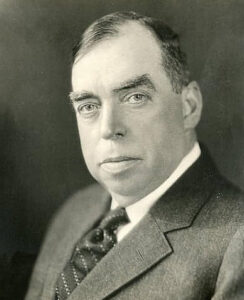 Irvin S. Cobb (June 23, 1876–March 10, 1944) was a journalist and humorist best known for his colloquial handling of familiar situations with ironical, penetrating humor. Cobb was elected to The Lambs in 1913 as a Professional member. He served two terms as The Boy (vice-president), in 1916-1917 and 1919-1920. He was a beloved member and wrote for the Gambols and the club magazine, The Script.
Irvin S. Cobb (June 23, 1876–March 10, 1944) was a journalist and humorist best known for his colloquial handling of familiar situations with ironical, penetrating humor. Cobb was elected to The Lambs in 1913 as a Professional member. He served two terms as The Boy (vice-president), in 1916-1917 and 1919-1920. He was a beloved member and wrote for the Gambols and the club magazine, The Script.
Cobb was born on June 23, 1876, in Paducah, Kentucky. Cobb was fiercely proud of his home state: “To be born in Kentucky is a heritage; to brag about it is a habit; to appreciate it is a virtue,” he said.
He was also a screenwriter and actor, known for Steamboat Round the Bend (1935), Everybody’s Old Man (1936) and The Face in the Dark (1918).
At 19 Cobb became managing editor of the Paducah Daily News, a newspaper he joined when he was 17 years old. He relocated to New York in 1904, where he became a staff writer for the New York World. First through syndicated newspaper features and later in magazines, he became widely known for such articles as “Speaking of Operations,” which in book form sold more than 500,000 copies, and for short stories, of which he wrote more than 300.
Cobb was the author of nearly 70 books, including novels, short story collections, essays, memoirs, and collections of newspaper and magazine articles. His first book, “Talks with the Fat Chauffer,” was published in 1909 and his last, “Piano Jim and the Impotent Pumpkin Vine,” was released posthumously in 1950. Although many of his works have a serious bent, most were infused with rural Kentucky wit and hyperbolic humor.
Cobb’s stories about a shrewd and kindly Kentucky judge, Judge Priest, first brought him fame. Some of them were collected in Back Home (1912) and Old Judge Priest (1916). He wrote more than 60 books and thousands of columns for journals and traveled throughout the country as a lecturer and after-dinner speaker. He also wrote plays, and, with the filming of the Judge Priest stories, he went to California, where he wrote scenarios and acted in motion pictures. He continued writing for films well into the 1930s. The Woman Accused, starring Cary Grant and Nancy Carroll, was released in 1933.
In 1930, Cobb appeared with fellow journalist Grantland Rice in a short film fishing together in Smithtown, Long Island. It has sound and has Cobb’s famous wit.
Cobb appeared as an actor in 10 movies between 1932 and 1938. His major roles were in Pepper, Everybody’s Old Man (1936) and Hawaii Calls (1938). He was selected to host the sixth Academy Awards ceremony in 1935.
Cobb was ardently anti-prohibition and a prominent member of the Association Against the Prohibition Amendment, founded in 1919 by Capt. W.H. Slayton, a retired naval officer. The association and its two most prominent members were credited with helping end Prohibition in 1934. Cobb’s crusade prompted one of his most famous novels, “Red Likker” (1929). The novel is set after the Civil War and focuses on an old Kentucky family headed by Colonel Atilla Bird, who operates Bird & Son distillery until the advent of Prohibition in 1920. Cobb once lamented that before Prohibition, “Men of all stations of life drank freely and with no sense of shame in their drinking… Bar-rail instep, which is a fallen arch reversed, was a common complaint among us.”
He was married to Laura Spencer Baker in 1900. They couple had one daughter.
Irvin S. Cobb died on March 11, 1944 in New York. He was 68 years old. He is interred in Oak Grove Cemetery in Paducah. Cobb’s epitaph is two words: “Back Home.” A bridge across the Ohio River that connects Illinois to Kentucky was named the Irvin S. Cobb Bridge.